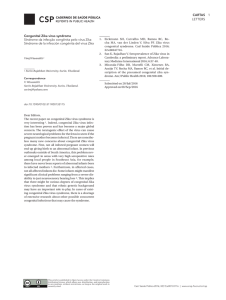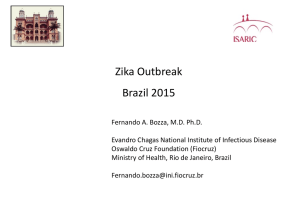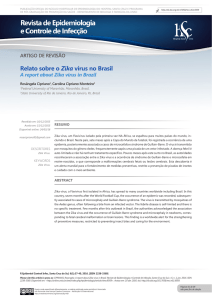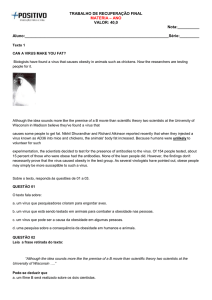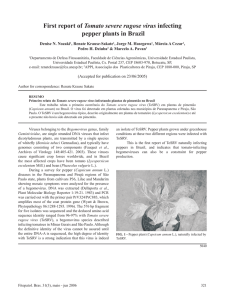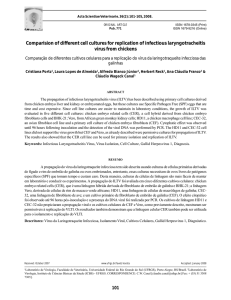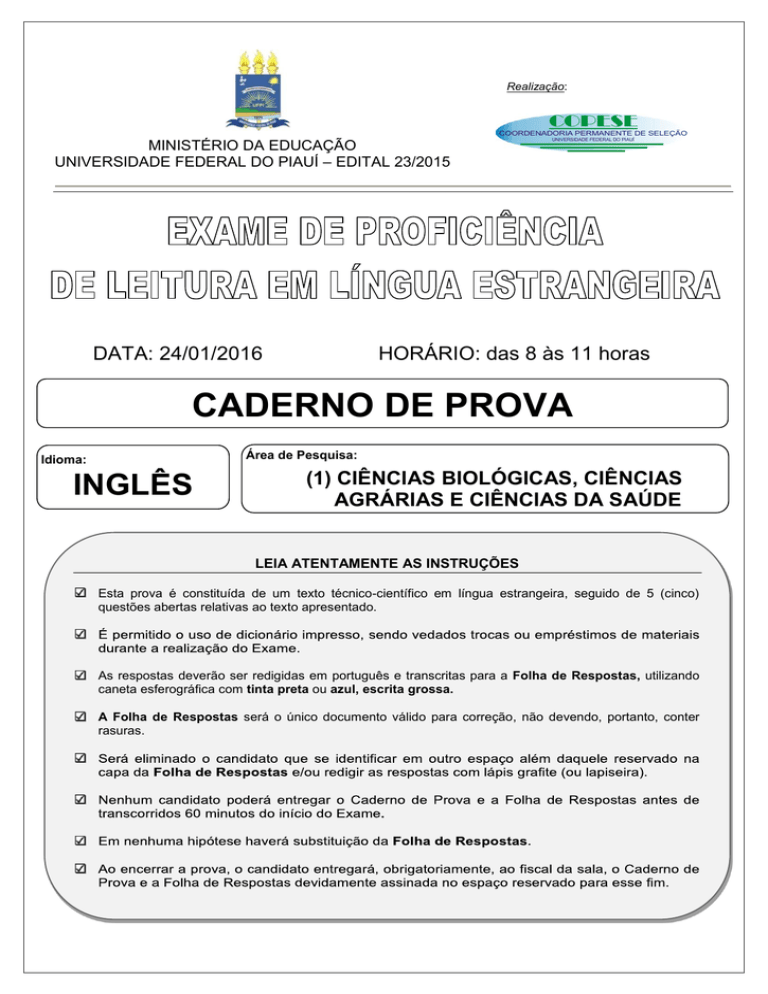
Realização:
COPESE
COORDENADORIA PERMANENTE DE SELEÇÃO
MINISTÉRIO DA EDUCAÇÃO
UNIVERSIDADE FEDERAL DO PIAUÍ – EDITAL 23/2015
DATA: 24/01/2016
UNIVERSIDADE FEDERAL DO PIAUÍ
HORÁRIO: das 8 às 11 horas
CADERNO DE PROVA
Área de Pesquisa:
Idioma:
INGLÊS
(1) CIÊNCIAS BIOLÓGICAS, CIÊNCIAS
AGRÁRIAS E CIÊNCIAS DA SAÚDE
LEIA ATENTAMENTE AS INSTRUÇÕES
Esta prova é constituída de um texto técnico-científico em língua estrangeira, seguido de 5 (cinco)
questões abertas relativas ao texto apresentado.
As respostas deverão ser redigidas em português e transcritas para a Folha de Respostas, utilizando
caneta esferográfica com tinta preta ou azul, escrita grossa.
A Folha de Respostas será o único documento válido para correção, não devendo, portanto, conter
rasuras.
EVERYTHING YOU NEED TO KNOW ABOUT ZIKA VIRUS
By HELEN BRANSWELL JANUARY 14, 2016
If you’ve heard about Zika virus and are wondering what in the world it is, you are likely not alone.
A virus few knew about before late last year, Zika has exploded onto the world stage in recent weeks. The reason:
Health officials in Brazil have theorized that it is responsible for the country’s alarming rise in women delivering
babies with a tragic birth defect known as microcephaly. Babies born with the condition have abnormally small heads
and underdeveloped brains. In this case, their life expectancy and development prospects are unclear.
Most years, Brazil would report somewhere around 150 cases of microcephaly. Since last October, more than 3,500
babies have been born with the condition.
The country experienced a major outbreak of Zika virus starting in May, with infections estimated in the hundreds of
thousands. Health officials have speculated that, for some women, infection in pregnancy has led to an increased rate
of miscarriages and an epidemic of babies with microcephaly.
So what exactly is Zika virus? And does it threaten other parts of the world? Read on.
Q: What is Zika?
A: It’s an arbovirus, a broad classification, which means it is a virus that is transmitted by an arthropod — a mosquito,
a tick, or a flea. More specifically, it is from a family of viruses called flaviviruses. You likely have heard of some other
viruses in that disease-causing family: West Nile virus, dengue virus, and yellow fever virus.
Q: Why is it called Zika?
A: The virus was named after the region where it was found — in the Zika Forest of Uganda — in 1947.
Q: What is the infection like? Are there any treatments or vaccines?
A: Zika typically causes a mild infection. Flu-like symptoms — fatigue, aches, and pains — are most commonly
reported, along with a skin rash. It often goes undiagnosed; people infected may not seek medical care. When they
do, it can be confused for a mild case of dengue fever. Some tests can’t distinguish between the two.
There is no specific treatment. There is no vaccine to prevent infection and a vaccine will be difficult to develop.
It is suspected that Zika infection may trigger lifelong immunity to the virus, says Ann Powers, an arbovirus expert with
the Centers for Disease Control and Prevention’s National Center for Emerging Zoonotic and Infectious Diseases. If
that turns out to be true, people who have been infected could not be reinfected.
Q: Don’t the experts know whether it triggers lifelong immunity?
Surprisingly little is known about Zika virus. It hasn’t been studied much in the past because it wasn’t thought to be a
significant cause of human disease.
It started to garner more scientific attention, though, in 2007 when there was an unexpected Zika outbreak in Yap, an
island that is part of Micronesia. Then, in 2013, there was an outbreak in French Polynesia. The virus was on the
move. Since Brazil reported its first cases last May, a series of South and Central American countries have diagnosed
Zika infections.
Q: Is microcephaly the only serious suspected complication of Zika infection?
A: No. There is also a suspicion it is linked to an increase in cases of Guillain-Barré syndrome, a condition in which
progressive paralysis sets in. Patients generally recover fully, but there are rare fatal cases. GBS has been linked to
other infections, including influenza.
Q: How does it spread?
A: Zika virus is transmitted to people by two species of mosquitoes, Aedes aegypti and Aedes albopictus. (The latter is
thought to play a more minor role in spread.) Mosquitoes become infected by taking a blood meal from an infected
person and then they pass the virus as they bite other people. There is also evidence that Zika virus can be
transmitted through sex.
Q: Why would infection with Zika virus during pregnancy cause brain development to be stunted in the
developing fetus?
A: No one knows, yet.
That said, it is known that infection during pregnancy with some other viruses — rubella and cytomegalovirus or CMV
— increases the risk of microcephaly in the infant, says Scott Weaver, director of the Institute for Human Infections
and Immunity at the University of Texas Medical Branch in Galveston.
Q: What is the evidence for a link between Zika infection and microcephaly?
A: The evidence is largely circumstantial, Weaver says. The sharp rise in the number of babies born with the condition
started a few months after the virus arrived. And microcephaly cases have increased in places where lots of Zika
cases were diagnosed.
But more persuasive evidence is starting to emerge. Brazilian scientists found traces of Zika virus in amniotic fluid
from two women who were carrying fetuses identified as having microcephaly.
And scientists at the CDC have found traces of the virus in brain tissue from two infants with microcephaly who died
shortly after birth, as well as in the placenta from two women who miscarried fetuses with the condition.
Q: If the link is real, why haven’t microcephaly cases increased in other places where Zika outbreaks have
occurred?
A: Health officials in French Polynesia searched the country’s records for microcephaly cases after hearing of what
was happening in Brazil, the CDC’s Peterson says. Where they would normally see no cases or maybe one in a year,
they saw 12 in the months after their Zika outbreak.
As for the lack of reports from other countries of Latin America and the Caribbean where Zika virus has been
spreading, it may just be that women infected during pregnancy haven’t yet started to give birth, Weaver says.
Also, if a condition is rare, it can be hard to see that there’s been an increase if you are looking in a small population.
French Polynesia only saw the increase once they went looking for it. But in Brazil, with more than 200 million people,
an increase is easier to see.
Says Weaver: ―I think the lack of reporting in other countries is not informative at this point.‖
Adapted from: http://www.statnews.com/2016/01/14/everything-need-know-zika-virus/
EM HIPÓTESE ALGUMA, SERÁ CONSIDERADA A RESPOSTA NESTE CADERNO.
Depois de ler o texto, responda as questões a seguir em português.
QUESTÃO 01 - A frase ―If you’ve heard about Zika virus and are wondering what in the world it is, you are likely not
alone‖ sugere que o vírus Zika era pouco conhecido até há pouco. O que, de acordo com o texto, fez com que ele
ficasse conhecido mundialmente?
______________________________________________________________________________________________
______________________________________________________________________________________________
______________________________________________________________________________________________
______________________________________________________________________________________________
______________________________________________________________________________________________
______________________________________________________________________________________________
______________________________________________________________________________________________
QUESTÃO 02 - Por que, segundo o texto, a infecção causada pelo vírus Zika é difícil de ser diagnosticada?
______________________________________________________________________________________________
______________________________________________________________________________________________
______________________________________________________________________________________________
______________________________________________________________________________________________
______________________________________________________________________________________________
______________________________________________________________________________________________
______________________________________________________________________________________________
______________________________________________________________________________________________
QUESTÃO 03 - De que formas o vírus pode ser transmitido, de acordo com o texto?
______________________________________________________________________________________________
______________________________________________________________________________________________
______________________________________________________________________________________________
______________________________________________________________________________________________
______________________________________________________________________________________________
______________________________________________________________________________________________
______________________________________________________________________________________________
______________________________________________________________________________________________
QUESTÃO 04 - O texto menciona três evidências que permitem aos cientistas estabelecer uma relação entre os casos
de microcefalia e o vírus Zika. Quais são elas?
______________________________________________________________________________________________
______________________________________________________________________________________________
______________________________________________________________________________________________
______________________________________________________________________________________________
______________________________________________________________________________________________
______________________________________________________________________________________________
______________________________________________________________________________________________
______________________________________________________________________________________________
______________________________________________________________________________________________
______________________________________________________________________________________________
QUESTÃO 05 - Por que somente recentemente se estabeleceu uma relação entre microcefalia e o vírus Zika?
______________________________________________________________________________________________
______________________________________________________________________________________________
______________________________________________________________________________________________
______________________________________________________________________________________________
______________________________________________________________________________________________
______________________________________________________________________________________________
______________________________________________________________________________________________
______________________________________________________________________________________________
______________________________________________________________________________________________

